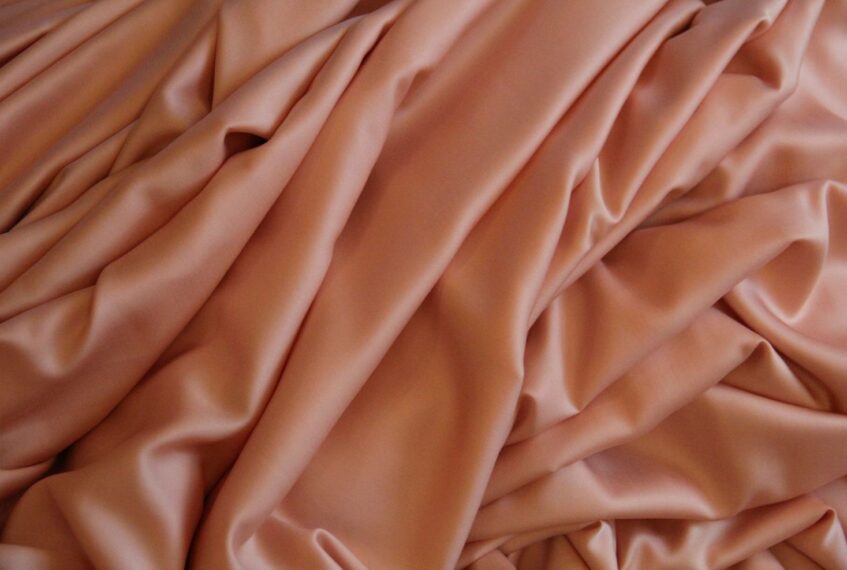Lyocell fabric, also known as Tencel, is a type of rayon fabric that is derived from wood pulp through a solvent spinning process. Cellulose fibers are dissolved and then extruded through small holes, coagulating into fibers in an aqueous bath below. This allows the fibers to retain a more natural molecular structure compared to other types of rayon.
Production Process of Lyocell Fabric
The production process of Lyocell Fabric begins with raw wood materials like eucalyptus, which are broken down and dissolved using an organic solvent. This solvent breaks the wood down into individual cellulose fibers while also removing lignin and hemicellulose. The cellulose fibers are then extruded through spinnerets into a bath containing the same solvent. Here, the solvent is removed and replaced with water, allowing the fibers to solidify and take shape. The fibers are dried and processed into yarns and fabrics. This closed-loop process recycles over 99% of the solvent used.
Properties and Characteristics of Lyocell Fabric
Some key properties and characteristics of lyocell fabric include:
– Soft and breathable: Lyocell fabrics have a soft, silky handfeel similar to cotton but are more breathable. This makes them comfortable against the skin.
– Absorbent: Being derived from cellulose, lyocell fabrics are highly absorbent and quick drying. They can hold up to 35% of their weight in moisture.
– Durable: Lyocell fibers are strong and durable despite being fine in diameter. They are resistant to pilling and maintain shape well through washing and wear.
– Biodegradable: Lyocell is naturally biodegradable as it breaks down similarly to natural cellulose fibers when composted. It poses minimal threat to the environment.
– Hypoallergenic: The closed-loop production process results in lyocell having low microbial content, making it hypoallergenic and gentle on sensitive skin.
– Wrinkle-resistant: Lyocell’s fiber structure gives fabrics a smooth, wrinkle-resistant quality without the use of chemicals.
Uses and Applications of Lyocell Fabric
Given its versatility and eco-friendly production process, Lyocell Fabric has applications across various industries:
Apparel: Lyocell is commonly used for clothing like t-shirts, dresses, underwear and athletic wear due to its breathability, strength and soft feel. Major brands produce lyocell blends.
Home textiles: Sheets, towels and linens made from lyocell stay soft, absorb moisture well and resist bacteria growth ideal for bathroom items.
Medical textiles: Its hypoallergenic properties make lyocell suited for medical uniforms, wound dressings, sanitary pads, and other single-use items.
Industrial fabrics: Lyocell fibers are also utilized in filter cloths, conveyor belts and engineered fabrics due to high durability and resistance to chemical and heat damage.
Composites: Manufacturers are experimenting with lyocell fiber reinforced composites for use in automotive and construction industries to improve sustainability.
Benefits of Lyocell Fabric
Here are some key sustainability and performance benefits of lyocell fabric:
– Eco-friendly production: The closed-loop process uses less harsh chemicals than viscose/rayon and lets solvent be reused. CO2 emissions are also lower.
– Renewable resource: Lyocell is manufactured from wood pulp sourced from sustainably managed forests, making it a renewable alternative to oil-based fibers.
– Biodegradable: Lyocell breaks down quickly without harming the environment, reducing the fiber’s overall environmental impact.
– Absorbs moisture well: The absorption properties keep skin dry and comfortable compared to synthetic materials prone to sweat buildup.
– Resists bacteria: The closed production prevents microbial contamination, reducing odors and prolonging garment lifespan.
– Hypoallergenic: Lyocell’s breathable purity makes it a hypoallergenic, sensitive skin-friendly option versus common irritants in other fabrics.
– Soft texture: It has a luxurious drape and feel to fabrics reminiscent of higher-end modal or cotton without resorting to intensive farming methods.
Lyocell fabric demonstrates how sustainable, natural materials can perform on par with or better than traditional and synthetic fibers. Its versatile properties and eco-friendly production process have made it a popular eco-friendly option adopted by many apparel and home goods brands. As technology further optimizes lyocell, its use will likely continue expanding across industries seeking greener solutions.
*Note:
1. Source: Coherent Market Insights, Public sources, Desk research
2. We have leveraged AI tools to mine information and compile it

